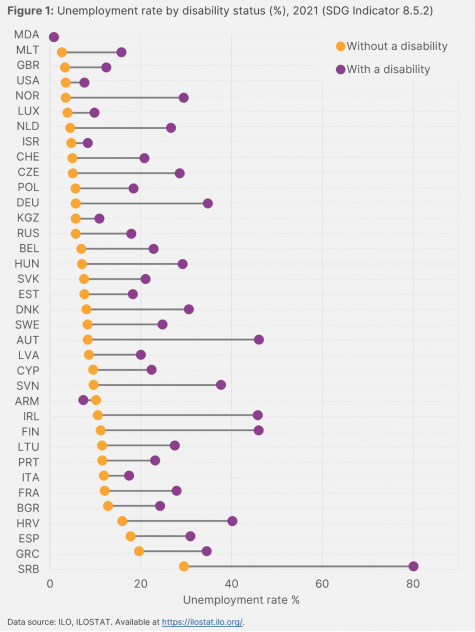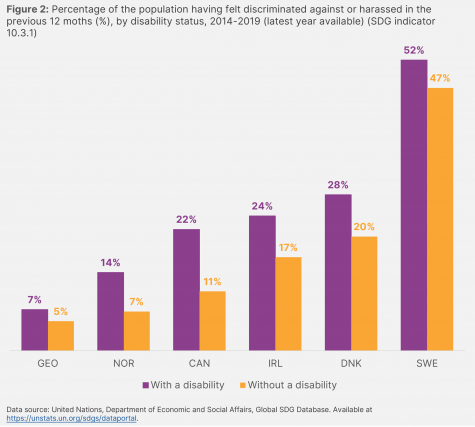As the international community marks 75 years since the adoption of the groundbreaking Universal Declaration of Human Rights, UNECE calls for commitment and practical measures from governments and all stakeholders in the region to uphold the human rights of all persons including those with disabilities.
Across countries in Europe, North America and Central Asia, persons with disabilities are disadvantaged in the labour market and are more likely to report experiencing discrimination and harassment. These findings from the recent review of progress in the UNECE region towards priorities defined in the International Conference on Population and Development (ICPD) Programme of Action point to the need for accelerated efforts to ensure persons with disabilities are not left behind.
Persons with disabilities are nearly three times more likely to be unemployed than those without disabilities
Article 23 of The Universal Declaration of Human Rights enshrines the right to work and protection against unemployment. Access to decent work is one of the most effective ways to protect against poverty and social exclusion. In the UNECE region, persons with disabilities are nearly three times more likely to be unemployed than those without disabilities at the regional level, and are among the most disadvantaged in the labour force. In nearly every country with data, the unemployment rate in 2021 among persons with a disability was at least twice as high as for persons without disabilities (Figure 1). In more than 10 countries, the unemployment rate among persons with disabilities was four times as high compared to those without disabilities.
Inclusive labour markets—where everyone of working age can participate in quality, paid work—enable people to join and remain in the workforce. The United Nations Convention on the Rights of Persons with Disabilities (CRPD) calls on States to safeguard and promote the realization of the right to work for persons with disabilities through legislation that prohibits discrimination, facilitates access to training, supports the acquisition of employment and entrepreneurial activities, ensures the provision of workplace accommodations, and protects the rights of workers with disabilities. Countries in the UNECE region are taking action to make labour markets more inclusive. Greece, for example, established the National System of Vocational Education and Training and Lifelong Learning in 2021, placing particular emphasis on apprenticeships for persons with disabilities. Canada’s 2022 Disability Inclusion Action Plan includes a new employment strategy for persons with disabilities. Georgia has developed a national action plan on employment that includes specific goals to support the employment of persons with disabilities.

Persons with disabilities more likely to experience discrimination than those without disabilities
Despite progress to strengthen legal frameworks that uphold and protect the rights of persons with disabilities, discriminatory attitudes represent barriers to social and economic inclusion. There is limited evidence regarding the percentage of people with disabilities that have experienced discrimination and harassment. Still, according to surveys conducted in six countries in the region between 2014 and 2019, persons with disabilities were more likely to have experienced discrimination or harassment in the 12 months before the respective survey than persons without disabilities (Figure 2). Intersecting characteristics and identities can compound experiences of discrimination. Among women, those with disabilities are two to three times more likely to have experienced discrimination or harassment than those without disabilities. Older persons, who are more likely than younger persons to have a disability, may face both ageism and discrimination based on disability status.

The importance of participatory approaches for the protection of rights and social inclusion
Participatory governance — or inclusive governance — calls for everyone affected by a particular decision to be able to take part in the decision-making process, without discrimination. The 2030 and ICPD Agendas highlight the importance of such approaches and call on countries to ensure inclusive decision-making.
The recent UNECE Regional Conference on ICPD, “Population and Development: Ensuring Rights and Choices” highlighted the importance of not only ratifying and implementing relevant international conventions but also including those impacted by policies in decision-making processes. Representatives of civil society called for legal instruments to eradicate all forms of discrimination, advocated for an intersectional and active approach to promote equality, and emphasized the important role of Civil Society Organizations in strengthening representation of vulnerable groups. Youth delegates issued a call for universal fulfilment of human rights including through inclusive decision-making and environments that allow all persons including those with disabilities to shape their own futures.
Kazakhstan is one country in the region that is taking action to include persons with disabilities in governance and decision-making. In the 2023, a new quota system for persons with disabilities was applied in elections in the country, increasing the number of officials with disabilities elected to parliament and municipal governments. The Senate of Kazakhstan has also established a Council on Inclusion as a mechanism for ensuring the rights of persons with disabilities.
Human Rights Day commemorations this year look towards the future of human rights, providing a timely reminder that effective social inclusion and non-discrimination remain goals for all countries in the UNECE region.
Read more


